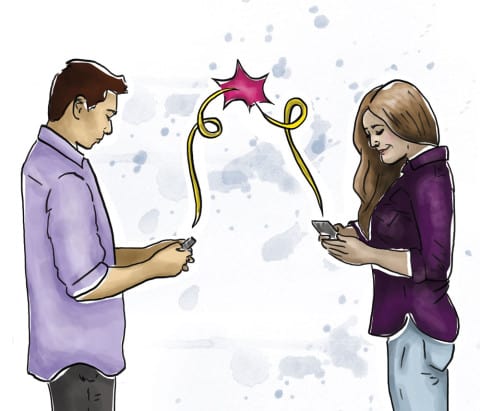MICHELLE MANABAT
 Social media has become a big part of our identity — most of us can’t live a day without it — and it’s easy to see that it affects us in both positive and negative ways. However, it’s important to note that outside of social media we still need social lives.
Social media has become a big part of our identity — most of us can’t live a day without it — and it’s easy to see that it affects us in both positive and negative ways. However, it’s important to note that outside of social media we still need social lives.
Through Facebook, I stay in touch with my friends and relatives from all over the world — the purpose it was made for. Unfortunately, Face- book and other social networking sites are so popular that they’ve become a sanctuary for people who are seeking unnecessary attention.
I thought I had decent friends until I saw their duck face selfies, pictures of everything that goes through their heads and depress- ing statuses about how their life sucks — which more often than not is just an exaggeration of something so small — like how a Starbucks employee misspelled their name. I do hope they realize that they are just making themselves look stupid, but other problems do exist in social media besides the trivial.
“Social media makes us antisocial” is almost cliché, but researchers have found evidence that it might actually be true. Psychologists believe that because communicat- ing online is so easy and convenient it prevents us from developing real, interpersonal communication skills.
“I think that with kids, it’s a lot easier to communicate certain things online than it is to in person,” said Michael S. Broder, renowned psychologist and bestselling author. “I mean, kids who have a problem relating socially have found a way to avoid learning those skills and I don’t think that’s a good thing at all.”
Social networks might have the power to interfere with how we personally interact with other people, but I think we can decide whether to let this happen or not. I love being connected to my friends who live on opposite sides of the world. Therefore I check Facebook a lot, but my phone — which is my portal to social networks — is not stopping me from hanging out with my other friends. We do fun activities together and have real face-to-face conversations. Just because some people are incapable having social interactions in the real world doesn’t mean social media stops everyone from doing so. There are also some people who are more comfortable behind the screen and prefer socializing online. Patricia Greenfield, director of the Children’s Digital Media Center in Los Angeles, believes that instead of having intimate relationships with others, young adults procure personal support and affirmation from “likes” and feedbacks to their online posts.
“We found in our study that people — college students — are not getting social support from being on the phone. They’re getting social support through bigger networks and having a sense that their audience is large,” Greenfield noted in her research. “The whole idea behind intimacy is self-disclosure. Now they’re doing self-disclosure to an audience of hundreds.”
Social media has pros and cons regarding its effect on our social skills. But the most serious prob- lem brought by social networks is cyber-bullying. Bullying in social networks is usually worse than in person because cyber-bullies are often unaware of how their hateful posts affect others. Additionally, bullies may be more likely to say things they wouldn’t otherwise.
“They probably wouldn’t engage in bullying activity if they were face-to-face because of the consequences if they were caught in person by authority figures,” said Krystine Batcho, a psychology professor in Lemoyne College.
In extreme cases, teens and adults have committed suicide after being bullied online. The Canadian government has created laws against cyber bullying and has been actively raising awareness. While it is a good thing that the government is putting in effort to provide online protection, people need to realize that the solution is sometimes as easy as clicking the “block” or “unfriend” button.
Social networks can be consid- ered an addiction because people can’t stay away from them and they can even ruin lives, but let’s not forget their advantages. People from all over the world communicate mainly through social media, and news trends and information spread faster than ever.
Social media influences us more than we care to admit. Every once in a while we need a reminder that social media is supposed to improve our social life — not replace it. We have to learn how to control our networks before they controls us.
—
Graphic: Stephanie Mah/Graphics Editor
Leave a Reply